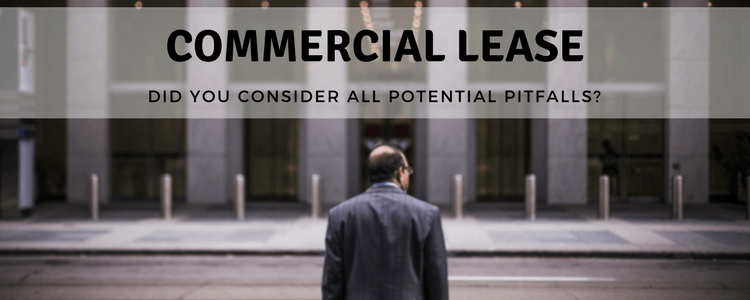COMMERCIAL LEASE: Did you consider all potential pitfalls?

When evaluating a commercial lease, it’s important to keep in mind what sort of contract clause you should expect to see—and which ones to be careful of. Working with an experienced real estate lawyer in Arizona will allow you to negotiate a better lease and avoid legal issues down the road. Here are some of the commercial lease terms that tend to be most important to our clients:
- Rent issues—for example, are there automatic increases, and if so, what are they based on? What components are there to monthly rent?

- Are there CAM (“common area maintenance”) charges, and if so, how are they determined and can they increase? This is an area where tenants are often not paying close attention, and landlords and property managers sometimes take advantage.
- Tenant improvement deductions or allowances. How are they determined and verified? Is there a rent-free period before the tenant moves in?
- What is the term of the lease, and can it be extended? If so, on what terms? I have seen tenants put in a very difficult negotiating spot because their lease is almost up, they have a successful business, and the landlord knows they do not want to move.
- Are there provisions that restrict the use of the premises? Common provisions limit the type of business, type or size of signage, noises and smells from the tenant’s operation, and so forth.
- What changes can the tenant make to the premises, and at whose expense?
- What insurance is each party required to have, and who has to pay for it? I have seen leases where the landlord has extensive insurance requirements, but the tenant has to pay for it through CAM charges or otherwise.
- Who will maintain and repair the various parts of the premises? This can be one of the most costly parts of the lease if not carefully negotiated. For example, I have seen leases that require a tenant to replace the building’s HVAC system if it fails, even in the last month of the lease.

- Is a personal guarantee required, and if so, upon what terms? Most commercial leases do require tenant business owners to sign personal guarantees. However, sometimes this point can be negotiated. For example, I have had good luck in negotiating personal guarantees that end after a certain period of time (often after two or three years of timely rent payments), or personal guarantees that are capped as to liability amount.
- Assignment and subletting. Tenants are usually tightly controlled in what subletting they can do without the landlord’s permission. But there is often room for negotiating terms—for example, the landlord might be willing to agree in advance to certain types of businesses as sublessees, or might at least agree to be reasonable when deciding whether to permit a sublease.
There are several other types of clauses that commonly arise in commercial leases. Among them are security deposit terms and amount; taxes; parking; definition of the premises; waiver; extensions and holdover provisions; personal property; estoppel certificates and other provisions that come into play if the landlord is looking to sell the premises; force majeure (also known as “acts of God”); notice provisions; whether a lease can be recorded; confidentiality; noncompete provisions (where a tenant might be prohibited from opening a similar store within a few miles—or a landlord might be prohibited from leasing nearby premises to a business that competes with the tenant); attorneys’ fees and costs; brokerage relationships; and more.
It’s useful to remember that commercial leases are almost always drafted by the landlord, which means they are written in favor of the landlord, not the tenant. It is often a costly mistake for a tenant to sign a commercial lease without at least analyzing what is in there and trying to negotiate particularly oppressive provisions. Sometimes clients come into our office to discuss a dispute with a landlord, and the situation is difficult because they have already signed a very burdensome lease. The time to make sure that your lease is fair is when you are negotiating it. I have also observed that landlords are never more interested in addressing tenants’ concerns than when they are trying to get those tenants to sign a lease and pay an initial deposit!
Of course, every tenant and landlord is unique, and every lease is different as well. Because so much money is typically at stake in a commercial lease, it’s worth using some caution, taking the time to negotiate and seeking professional expertise up front to protect yourself.
Approved By:

1930 N Arboleda #200
Mesa, AZ 85213
Office: 480-325-9900
Email: [email protected]
Website: dentonpeterson.com